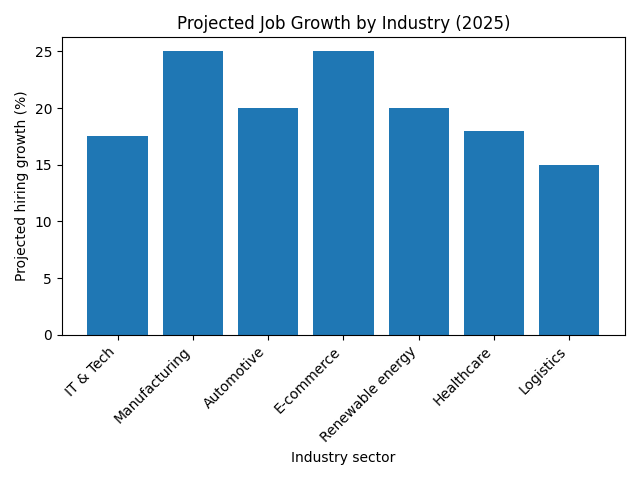Introduction: A Surging Job Market
India’s job market is poised for rapid expansion with an estimated 500,000 new opportunities in 2025 and a 19% increase in hiring intent. Early 2025 staffing activity is projected to surge by 40%, signalling a robust recruitment landscape.
Sector-Specific Growth
Growth is concentrated in key sectors. IT and technology roles are forecast to grow 15‑20%, with specialised tech roles surging 30‑35%. Manufacturing leads with a 25% increase in hiring, while the automotive sector e
xpects a 20% rise. Emerging sectors such as e‑commerce (25%), renewable energy (20%), healthcare (18%) and logistics (15%) are also set to expand.

The chart above illustrates projected hiring growth across industries in 2025, highlighting robust gains in manufacturing and e-commerce while showcasing steady expansion in emerging sectors.
Skills and Recruitment Trends
Recruiters increasingly prioritise specialised skills: 60% of employers emphasise technology and data‑science expertise. Fresh graduates with niche IT specialisations could see a 15‑20% increase in hiring. Green jobs and sustainability roles are also emerging.
Salary and Compensation Trends
With an increasingly competitive labour market, salaries are expected to rise 10–20% in 2025, according to industry forecasts. Entry-level positions will see modest increases, but specialised tech and AI roles could command premium hikes of 35–55%, reflecting demand for advanced skill sets. Employers are also offering flexible compensation packages, variable performance bonuses and benefits like health insurance and remote-work allowances to attract and retain top talent.
Technological Evolution in Recruitment
Technology is reshaping how recruiters source and engage talent. Artificial intelligence and machine learning tools are automating candidate screening, while data-driven analytics help hiring managers make informed decisions. Virtual interview platforms and cloud-based applicant tracking systems streamline the hiring process, improving efficiency and candidate experience. Organisations that embrace HR technology will have a competitive edge in 2025.
Workplace Models and Flexibility
Hybrid work is becoming the norm: recruitment predictions indicate that about 60% of organisations will adopt hybrid working models in 2025, while only around one‑third will require employees to be fully on‑site . This flexibility helps attract talent across geographies and supports work–life balance. However, companies must develop policies and invest in collaboration tools to maintain productivity and engagement.
Challenges and Opportunities
Despite optimistic growth projections, organisations will face challenges such as talent shortages, skills gaps and the need to upskill workers for emerging roles. As competition for specialised talent intensifies, companies must invest in training and create robust employee value propositions. Regulatory compliance, data security and maintaining organisational culture in hybrid environments also require attention. Yet these challenges also bring opportunities: firms that embrace continuous learning, diversity and agile recruitment practices will /.
Conclusion
India’s recruitment and staffing landscape is poised for a remarkable year in 2025. With robust job creation, rising salaries and transformative technologies, employers have an opportunity to build agile, inclusive and future‑ready workforces. By embracing hybrid work models, investing in employee development and partnering with experienced HR solutions providers like Cloudare, organisations can navigate the challenges and thrive. Ready to transform your talent strategy? Reach out to us at hello@cloudare.in to discover how we can help.







Leave a Reply
You must be logged in to post a comment.